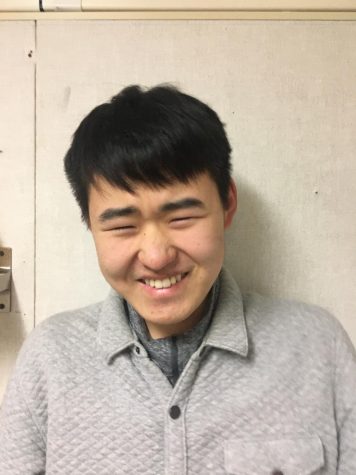Humans of Harker: The power of industry
Sahil Jain (12) learns through teaching
“From the very beginning, I knew how powerful the subject of computer science really is. Like I’ve seen from my dad’s story, computer science can actually transform these underprivileged children’s lives first hand. By learning this subject which is in such high demand in the industry now, they can actually get a chance to escape the poverty cycle. So I think from that I kind of grew inspired to actually help like children similar to how my dad was back in India, and found this organization for underprivileged children,” Sahil Jain (12) said.
Standing in front of a class of young children, teaching them about computer science, Sahil Jain (12) basks in his element. Whether it’s through acting out the role of Karel J. Robot to help his class understand the directions in their code or walking through buggy code one-on-one with a student, Sahil tries to teach as much as possible, to incentivize the students to learn the code and engage with computer science.
Looking back, Sahil recalled a time in his early childhood when his father brought home an old computer.
“I was just like clicking around the keys, and I thought that was also pretty cool,” Sahil said. “I had this intense fascination with computers even when I was like three, and I didn’t know what computers actually did.“
As Sahil has grown, so too has his view of computers. He’s researched the utilization of computer science in multiple different fields and established a nonprofit called CodingForAll that provides underprivileged children with opportunities to form a strong foundation in STEM.
Sahil already had a true passion for computer science, inspired by his father, who had come from a very poor area of India and, through dedicated hard work and computer science, rose all the way to become a successful entrepreneur in the Bay Area.
“From the very beginning, I knew how powerful the subject of computer science really is,” Sahil said. “Like I’ve seen from my dad’s story, computer science can actually transform these underprivileged children’s lives first hand. By learning this subject which is in such high demand in the industry now, they can actually get a chance to escape the poverty cycle. So I think from that I kind of grew inspired to actually help like children similar to how my dad was back in India, and found this organization for underprivileged children.”
Of course, Sahil faced many challenges. As the eighth-grade head of an organization that would rely on high-school volunteers to help and teach, encouraging these volunteers to listen and cooperate was perhaps the greatest hurdle.
“I remember [that] a lot of these people would immediately demand positions, even without doing any work. And I would consider myself a little bit of a pushover in the beginning, because I just didn’t really know how to operate a company. I didn’t know how to be a leader. So I would just immediately grant positions,” Sahil said.
Over time, however, as he taught classes and learned how to incentivize students with videogame focused lessons, small prizes and other such gimmicks, Sahil started to gain confidence in his abilities as not only a teacher but also a leader. He didn’t immediately become confident, but through this gradual process of teaching and learning Sahil eventually became able to stand his ground against the sorts of people who tried to push him over.
Anu Datar, who taught Sahil in the AP Computer Science with Data Structures and the Advanced Topics in Computer Science Compilers and Interpreters courses, witnessed this process of growth firsthand.
“[In] freshman year he was a very shy, quiet student, he seemed like an introvert at that time — he rarely spoke unless he was called upon,” Datar said. “And then by sophomore year he had blossomed into a confident young man. He had opinions, he would raise his hand whenever questions were asked. Senior year Sahil was very different, and he is much more in charge of his life. He knows exactly what he wants to do.”
Sahil’s journey hasn’t always been smooth. In tenth grade, he and his friend Arjun Akkiraju (12) founded a startup. Their company, A to N, attempted to create a product that could transform pieces of audio into bulleted notes. It didn’t come together.
“I think what we eventually realized was that, as high schoolers, simply didn’t have all those sorts of skills, like the technical skills, or like the marketing expertise required to actually build out the entire product and actually launch a successful startup,” Sahil said.
He took this failure as a learning opportunity and became inspired to seek further understanding of computer science and the process of entrepreneurship. This year he’s partnered with Arjun to start a company in the Incubator class. The company, QUP, seeks to eliminate the hassle of in-person waiting in line.
“[Sahil’s] personality is such that it makes working with him a lot of fun,” Arjun said. “Even when things aren’t going our way, he’s still able to bring the positives out of the situation and kind of make it a good time for all of us, even when we’re struggling. So that’s something that really keeps us going.”
This lighthearted attitude, taking minds off of the stresses and worries of the day, is something Sahil actively tries to bring with him, and something his friends appreciate. Anthony Xu (12), one of Sahil’s close friends, describes him as “bouncy” and “full of energy,” brightening everyone’s mood even when they’re faced with crises like college apps.
“[I feel best about myself] when I make successful jokes around my friends,” Sahil said. “Because most of my jokes fail — which is fine, that gets its own laughs as well — but when I finally hit that right joke is when it feels most satisfying.”

Jessie Wang (12) is the senior copy editor for the Winged Post and Harker Aquila. This is his fourth and final year on staff, and he hopes to continue...


















![“[Building nerf blasters] became this outlet of creativity for me that hasn't been matched by anything else. The process [of] making a build complete to your desire is such a painstakingly difficult process, but I've had to learn from [the skills needed from] soldering to proper painting. There's so many different options for everything, if you think about it, it exists. The best part is [that] if it doesn't exist, you can build it yourself," Ishaan Parate said.](https://harkeraquila.com/wp-content/uploads/2022/08/DSC_8149-900x604.jpg)




![“When I came into high school, I was ready to be a follower. But DECA was a game changer for me. It helped me overcome my fear of public speaking, and it's played such a major role in who I've become today. To be able to successfully lead a chapter of 150 students, an officer team and be one of the upperclassmen I once really admired is something I'm [really] proud of,” Anvitha Tummala ('21) said.](https://harkeraquila.com/wp-content/uploads/2021/07/Screen-Shot-2021-07-25-at-9.50.05-AM-900x594.png)







![“I think getting up in the morning and having a sense of purpose [is exciting]. I think without a certain amount of drive, life is kind of obsolete and mundane, and I think having that every single day is what makes each day unique and kind of makes life exciting,” Neymika Jain (12) said.](https://harkeraquila.com/wp-content/uploads/2017/06/Screen-Shot-2017-06-03-at-4.54.16-PM.png)








![“My slogan is ‘slow feet, don’t eat, and I’m hungry.’ You need to run fast to get where you are–you aren't going to get those championships if you aren't fast,” Angel Cervantes (12) said. “I want to do well in school on my tests and in track and win championships for my team. I live by that, [and] I can do that anywhere: in the classroom or on the field.”](https://harkeraquila.com/wp-content/uploads/2018/06/DSC5146-900x601.jpg)
![“[Volleyball has] taught me how to fall correctly, and another thing it taught is that you don’t have to be the best at something to be good at it. If you just hit the ball in a smart way, then it still scores points and you’re good at it. You could be a background player and still make a much bigger impact on the team than you would think,” Anya Gert (’20) said.](https://harkeraquila.com/wp-content/uploads/2020/06/AnnaGert_JinTuan_HoHPhotoEdited-600x900.jpeg)

![“I'm not nearly there yet, but [my confidence has] definitely been getting better since I was pretty shy and timid coming into Harker my freshman year. I know that there's a lot of people that are really confident in what they do, and I really admire them. Everyone's so driven and that has really pushed me to kind of try to find my own place in high school and be more confident,” Alyssa Huang (’20) said.](https://harkeraquila.com/wp-content/uploads/2020/06/AlyssaHuang_EmilyChen_HoHPhoto-900x749.jpeg)



